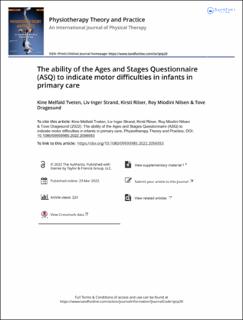The ability of the Ages and Stages Questionnaire (ASQ) to indicate motor difficulties in infants in primary care
Peer reviewed, Journal article
Published version

Åpne
Permanent lenke
https://hdl.handle.net/11250/3022192Utgivelsesdato
2022-03-23Metadata
Vis full innførselSamlinger
Originalversjon
Physiotherapy Theory and Practice. 2022, 1-8. https://doi.org/10.1080/09593985.2022.2056553Sammendrag
Introduction: Delayed achievement of motor milestones may be an early indicator of motor difficulties. Parent-reported questionnaires may serve as an efficient, low-cost screening to identify infants in need of further clinical assessment, and thus be a helpful tool in busy health care centers.
Purpose: To examine the ability of the Ages and Stages Questionnaire, second edition (ASQ-2) to indicate motor difficulties in infants using the Infant Motor Profile (IMP) as the reference standard.
Methods: A cross-sectional design was applied to examine the correlation between parent-reported data of the ASQ-2 and data from physiotherapist assessment using IMP. Included were 432 mainly low-risk infants aged 3–12 months from primary care.
Results: Overall, ASQ-2 gross and fine motor scores did not correlate well with the IMP total or domain scores. The ASQ-2 gross motor cut point (> 2SD below the mean), showed 34.3% sensitivity and 96.7% specificity using the 15th percentile from IMP performance domain as reference standard. The positive predictive value to indicate motor difficulties was 48%.
Conclusion: The motor domains of ASQ-2 have poor ability to identify infants with motor difficulties as indicated by their IMP scores in low-risk infants.
